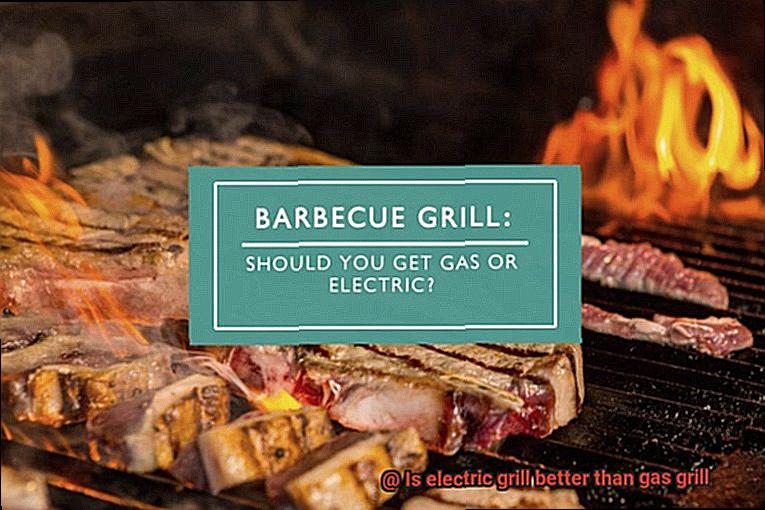Picture this: a warm summer night, the smell of sizzling burgers and hot dogs filling the air, and the sound of laughter as friends and family gather around the grill. Ah, there’s nothing quite like a good barbeque. But when it comes to choosing between an electric grill or a gas grill, many people are left scratching their heads. So, let’s settle this once and for all: is electric grill better than gas grill?
If you’re anything like me, then grilling is an essential part of your summer routine. Whether you’re hosting a big backyard bash or just whipping up a quick dinner after work, finding the right grill can make all the difference. Electric grills are often praised for their ease of use and convenience, while gas grills are loved for their versatility and speedy heating times. But which one truly reigns supreme?
In this post, we’ll take a deep dive into both options to uncover the pros and cons of each. From taste to temperature control, we’ll leave no stone unturned in our quest to determine whether electric or gas grills come out on top. So buckle up and get ready for some serious grilling knowledge.
Contents
Understanding the Difference between Electric and Gas Grills
It’s a common debate, and understanding the differences between these two types of grills is essential in making the right choice.
Electric grills are incredibly convenient and easy to use. They require minimal preparation time, are portable, and only need an electrical outlet to power up. These features make them ideal for apartment balconies or other areas where gas grills may not be allowed. Moreover, electric grills are less expensive upfront and require less maintenance over time.
However, one significant disadvantage of electric grills is that they do not get as hot as gas grills. This can make it challenging to achieve a good sear on meats or vegetables. Additionally, some people feel that electric grills do not impart as much flavor on the food as gas grills do.
In contrast, gas grills offer more power and versatility. They can reach higher temperatures faster and have more control over the temperature. Gas grills also produce a smokier flavor that many people prefer over electric grills.
Gas grills are fueled by propane or natural gas and use a burner system to produce heat. They are larger than electric grills and require extra equipment like propane tanks or natural gas lines. However, these features ensure that gas grills have more power and precision in cooking.
Ultimately, the choice between an electric or gas grill comes down to personal preference and specific needs. To help you decide, here are some pros and cons of each type:
Electric Grill Pros
- Convenient and easy to use
- Portable
- Less expensive upfront
- Ideal for indoor use

Electric Grill Cons:
- Limited heat output
- May not impart as much flavor on food
Gas Grill Pros
- More power and versatility

- Produce smoky flavor
- More control over temperature
Gas Grill Cons
- Larger and less portable
- Require extra equipment
- More expensive upfront
Advantages of Electric Grills

With so many options available, it can be tough to know which one is right for you. However, as an expert in the field, I can confidently say that electric grills have several advantages that make them a great choice. Here are just a few of the top benefits of electric grills:
- Convenience: One of the biggest advantages of electric grills is their convenience. Unlike gas or charcoal grills, electric grills don’t require any fuel to function. This means there’s no need to worry about running out of gas or cleaning up ash and debris after grilling. Plus, electric grills are incredibly easy to set up and use, making them perfect for beginners.
- Consistent Temperature Control: Another major advantage of electric grills is their ability to maintain a consistent temperature throughout the cooking process. This is thanks to the heating elements used by electric grills, which can be controlled digitally. As a result, your food will cook more evenly and have better texture and flavor.
- Safety: Electric grills are also much safer than gas grills. With an electric grill, there’s no risk of gas leaks or explosions that can occur with gas grills if not used properly. Plus, electric grills don’t produce toxic fumes or smoke, making them ideal for indoor use.
- Eco-Friendly: If you’re someone who cares about the environment, you’ll be pleased to know that electric grills are more eco-friendly than gas grills. They don’t emit harmful pollutants into the atmosphere, and they can be powered by renewable sources like solar or wind power.
- Affordability: Finally, electric grills are generally more affordable than gas grills. They require less maintenance and upkeep than gas grills, and they don’t need any fuel like gas or charcoal. This means you’ll save money in the long run while still being able to enjoy delicious grilled food.
Disadvantages of Electric Grills
If you’re considering purchasing an electric grill, it’s important to know that they come with their share of disadvantages. While they are known for their convenience and eco-friendliness, there are some drawbacks to be aware of before making the investment.
One of the biggest disadvantages of electric grills is their lower maximum temperature compared to gas grills. This can make it difficult to achieve that desired crusty exterior on your meats, which might be a deal-breaker for some grill enthusiasts.
In addition, electric grills may take longer to heat up compared to gas grills, which can be inconvenient for those who want to grill quickly or spontaneously. And while they are known for their ease of use, some people find that electric grills do not provide the same level of smoky flavor that can be achieved with gas or charcoal grills. This can result in a less rich and complex taste in grilled dishes.
Another disadvantage of electric grills is that they require an electrical outlet nearby, which can be inconvenient for outdoor use in certain settings. They are also typically more expensive upfront compared to gas grills.
Finally, maintenance can be more challenging with electric grills as they often require special cleaning solutions and cannot be submerged in water for cleaning like some gas grills. This means that keeping your electric grill clean and well-maintained may require a bit more effort.
Advantages of Gas Grills
If so, gas grills might be the perfect option for you. As an expert on the topic of gas grills, I’m here to share the numerous advantages that come with using a gas grill over an electric one.
First and foremost, gas grills heat up faster than their electric counterparts. This means that you can start cooking your favorite foods almost immediately. With a wider range of temperature control, you’ll have the ability to cook your food perfectly every time. Electric grills have set temperatures, which may not be suitable for all types of food.
Another advantage of gas grills is their higher heat output. This feature lets you sear meat better, giving you a more authentic grilling experience. Additionally, gas grills produce more smoke than electric grills, adding a smoky flavor to your food that’s hard to resist.
Durability is also a significant factor that sets gas grills apart from electric ones. Gas grills are often made of sturdy materials such as cast iron, stainless steel, or aluminum that are built to withstand high temperatures and outdoor weather conditions. In contrast, electric grills are commonly made of plastic and other less durable materials.
Finally, gas grills provide a convenience factor that electric grills do not quite match up to. Gas grills require no preheating time and can be used at any time without having to wait for the grill to heat up. Gas grills also require less maintenance than electric ones since they don’t have heating elements or other components that need regular cleaning or replacing.
Disadvantages of Gas Grills
As an expert in the world of gas grills, let me give you the low-down on the disadvantages of using gas grills.
Firstly, let’s talk about safety. Gas grills rely on propane or natural gas as fuel sources. Although these fuels are readily available and can be easily refilled, they also come with potential safety risks. Leaking gas can be extremely dangerous and even deadly if not handled properly. Therefore, it’s crucial to follow all safety precautions when using a gas grill.
Another downside of gas grills is their tendency to produce inconsistent heat. Temperature fluctuations can occur due to factors such as wind, temperature, and humidity, making it challenging to achieve consistent cooking results. This can be especially frustrating if you’re new to grilling or trying to cook more delicate dishes that require precise temperatures.
Cost is another factor to consider. Gas grills are generally more expensive than electric grills when it comes to both upfront costs and ongoing fuel expenses. While the initial investment in an electric grill may be higher, the cost of electricity is typically much lower than the cost of propane or natural gas over time.
Additionally, gas grills require regular maintenance to ensure they function properly. This includes cleaning the burners and other parts of the grill, replacing worn-out components, and checking for leaks on a regular basis. While this might not be a big deal for those who enjoy tinkering with their grills, it can be a hassle for those who just want to grill without worrying about maintenance.
Factors to Consider When Choosing a Grill
Choosing the perfect grill can be overwhelming, especially when faced with the decision of electric or gas. As a grilling expert, I’ve compiled a list of essential factors to consider before making your final decision.
Firstly, size is crucial. You don’t want to be stuck with a grill that can’t accommodate the amount of food you plan on cooking. If you’re planning on hosting large gatherings, go for a bigger grill.
The material used in the grill is also important. Stainless steel is an excellent choice for its durability and easy-to-clean surface. Cast iron is ideal for searing meat and retains heat exceptionally well. Aluminum grills are lightweight and highly portable.
Temperature control is crucial for cooking various types of food. Gas grills offer better temperature control due to multiple burners, while electric grills may have limitations with just one heating element.
Of course, cost is always an essential consideration. Electric grills tend to be less expensive, but they may not be as durable or efficient as gas grills. Gas grills offer better temperature control and versatility but can come at a higher price point.
Lastly, personal preferences and needs should be taken into account. If convenience is your top priority and you’ll only be cooking for small groups, then an electric grill might be the way to go. However, if you plan on cooking for larger groups and want more versatility in temperature control, then a gas grill may be the better option.
Which Grill is Best for You?
First and foremost, consider the type of cooking experience you want. If you’re all about that classic outdoor grilling experience with an open flame, then a gas grill is the way to go. On the other hand, if you’re looking for convenience and ease of use, an electric grill may be more your style.
Another key factor to consider is size. Are you hosting large gatherings or cooking for a big family? Then a gas grill with its larger cooking space may be the better option. But if you’re grilling on a small balcony or patio, then an electric grill’s compact size will fit your needs perfectly.
Cost is also an important consideration. While electric grills tend to be less expensive upfront, they often have a shorter lifespan and require more frequent replacement. Gas grills, while initially more costly, are built to last longer and require less maintenance over time.
Ultimately, the decision comes down to your personal preferences and individual needs. Are you prioritizing the authentic outdoor cooking experience with a gas grill or valuing convenience with an electric grill?
In summary, here are the key points to consider when deciding which grill is best for you:
- Type of cooking experience: Gas for that authentic outdoor flavor, or electric for convenience?
- Size: Gas for larger cooking spaces and electric for smaller areas.
- Cost: Electric grills are less expensive upfront but may require more frequent replacement; gas grills are more expensive initially but built to last longer.
Tips for Getting the Most Out of Your Grill
Grilling is a culinary art that can take your taste buds on a delicious journey, whether you own an electric or gas grill. However, to create mouth-watering meals, you need to know how to get the most out of your grill. Here are some tips that can help you grill like a pro.
Keep it Clean
Keeping your grill clean is essential for great tasting food. After each use, use a wire brush to clean the grates and remove any debris or grease. A clean grill not only enhances the flavor of your food but also ensures even cooking.
Preheat Properly
Preheating your grill is crucial to ensure that your food cooks evenly and to prevent it from sticking to the grates. For gas grills, turn the burners on high and close the lid for 10-15 minutes before cooking. For electric grills, let the grill heat up for at least 10 minutes before using it.
Use the Right Tools
Good quality tools are essential for successful grilling. Invest in a sturdy spatula, tongs, and a meat thermometer to make grilling easier and more enjoyable. Using the right tools can also help you avoid piercing your meat and losing its juices.
Experiment with Ingredients
Don’t limit yourself to just burgers and hot dogs. Grilling vegetables, seafood, and even fruit can add a unique and delicious twist to classic dishes. Try marinating your ingredients beforehand to enhance their flavors.
Know Your Cooking Methods
Knowing which cooking method to use for different types of food is important for great results. Direct heat is best for steaks and burgers while indirect heat is better for larger cuts of meat like brisket or pork shoulder. You can also experiment with smoking your food using wood chips or charcoal to add a smoky flavor.
Add Flavor
Adding flavor to your grilled foods can elevate them to the next level. From classic BBQ sauce to exotic teriyaki glaze, experimenting with different flavors and marinades can make your meals even more delicious. Don’t be afraid to get creative with your seasonings and spices.
ylfus05NLfI” >
Conclusion
After weighing the pros and cons of electric and gas grills, it’s clear that the choice between the two ultimately boils down to personal preference. Electric grills offer unparalleled convenience and ease of use, making them an excellent option for busy individuals who want to grill up a quick meal without fussing with propane tanks or charcoal briquettes. On the other hand, gas grills provide more power and versatility, allowing you to cook a wider range of foods at higher temperatures.
When selecting a grill, it’s important to consider factors such as size, cost, material used in construction, and your individual preferences. Whether you value portability over power or flavor over convenience will depend on your unique needs.
Regardless of which type of grill you choose, there are some tips that can help elevate your grilling game. Keeping your grill clean is crucial for maintaining optimal performance and preventing flare-ups. Preheating your grill properly ensures that food cooks evenly and locks in those delicious flavors. Using the right tools can make all the difference in achieving perfectly grilled meats and vegetables every time. And don’t be afraid to experiment with different ingredients and cooking methods to discover new flavor combinations that will leave your taste buds wanting more.
In conclusion, whether you opt for an electric or gas grill is entirely up to you. Both have their advantages and disadvantages, but with proper maintenance and experimentation, both types can produce mouthwatering meals that will impress even the most discerning palate.
You may also like:








